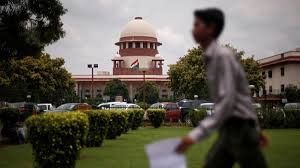[ad_1]
SUPREME COURT REITERATES: SECOND QUASHING PETITION IS NOT MAINTAINABLE ON GROUNDS ALREADY AVAILABLE DURING THE FIRST PETITION

In a significant reaffirmation of legal principles governing criminal procedural law, the Supreme Court on July 23, 2025, in the case titled M.C. Ravikumar v. D.S. Velmurugan & Ors. (SLP (Criminal) No. 12715 of 2022), held that a second petition under Section 482 of the Criminal Procedure Code (CrPC) seeking quashing of criminal proceedings is not maintainable on grounds which were available at the time of the first petition but were not urged.
A Bench comprising Justices Sandeep Mehta and Vikram Nath ruled that such second petitions violate the principle of Constructive Res Judicata and amount to an impermissible review of an earlier decision under the guise of a new petition. The Judgment was delivered in an appeal challenging a Madras High Court decision which had allowed a second Quashing Petition on grounds similar to those raised — but not argued in a previous petition.
Background of the Case
In December 2021, the Accused filed a petition under Section 482 CrPC before the Madras High Court seeking to quash a criminal complaint against them. The High Court dismissed the Petition. Subsequently, the Accused filed second Quashing Petition in September 2022, relying on the fact that a similar complaint involving the same parties and arising from the same transaction — but pertaining to a different property — had already been quashed by the High Court earlier in March 2020.
The High Court allowed the second petition, giving rise to the Complainant’s Appeal before the Supreme Court.
Supreme Court’s Findings
Delivering the verdict authored by Justice Sandeep Mehta, the Supreme Court held that the second petition was not maintainable, as the ground now raised was clearly available at the time of the first petition but was not argued then.
“The quashing by the High Court of a similar complaint…was an event that happened well before the dismissal of the first quashing petition…the said ground/plea was manifestly available…while seeking adjudication of the first quashing petition”, the Court observed.
The Court further emphasized that a second petition under Section 482 CrPC is only maintainable when there is a demonstrable change in circumstances or new material comes to light after the first adjudication. In absent of such a change, the second petition is hit by the doctrine of Constructive Res Judicata, which bars re-litigation of issues that could have been raised in earlier proceedings but were not.
Violation of Section 362 CrPC
In a scathing observation, the Court held that the High Court’s decision in the second petition effectively reviewed the earlier order of dismissal — which is prohibited under Section 362 CrPC. The Court observed, “Section 362 Cr.P.C. expressly bars review…except to correct some clerical or arithmetical error.”
The judgment clarified that inherent powers under Section 482 CrPC are not an avenue to re-agitate contentions, especially when those contentions were already available earlier.
Citing Precedents
The Supreme Court relied on its earlier ruling in Bhisham Lal Verma v. State of Uttar Pradesh 2023 SCC OnLine SC 1399, where it was categorically held that Section 482 CrPC cannot be used as a substitute for an appeal or review, nor can it be used to revisit dismissed contentions in a fresh garb.
Key Takeaways from the Ruling
- Constructive Res Judicata Applies to Criminal Proceedings: A second quashing petition is barred if the grounds were available earlier but not urged.
- No Review Power Under Section 482: High Courts cannot review or re-visit their earlier decisions under the garb of inherent jurisdiction.
- Section 362 CrPC is a Clear Bar: The CrPC bars review of a final order except for clerical or arithmetical corrections.
- Litigants Must Exercise Diligence: Accused persons must raise all available grounds at the time of the first petition, or risk losing the opportunity altogether.
Conclusion
This Judgment is a vital reminder of the scope of inherent powers under Section 482 CrPC and underscores the importance of procedural discipline in criminal litigation. It cautions against the misuse of successive petitions and ensures the finality of judicial decisions. The ruling sends a clear signal that the litigants cannot bypass the law by filing repetitive petitions, and High Courts must refrain from entertaining them without a demonstrable and legitimate change in circumstances.
Yash Hari Dixit
Associate
The Indian Lawyer and Allied Services
Please log onto our YouTube channel, The Indian Lawyer Legal Tips, to learn about various aspects of the law. Our latest Video, titled What Is Waqf? Legal Meaning, Rights & Key Judgments in india | Advocate Sushila Ram Varma | can be viewed at the link below:
https://www.youtube.com/watch?v=I-Ys1dG0pkQ&t=18s
[ad_2]
Source link

